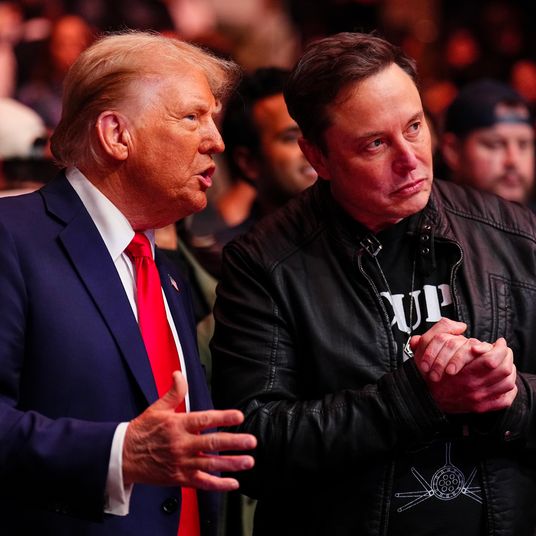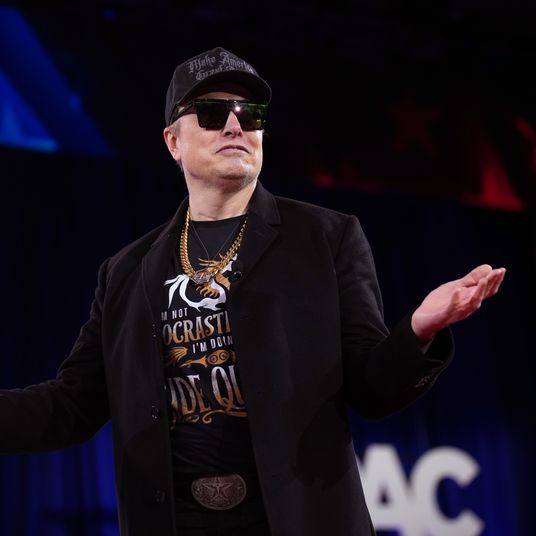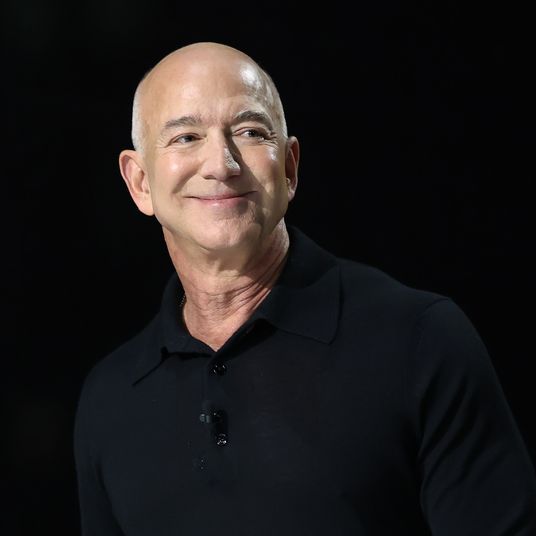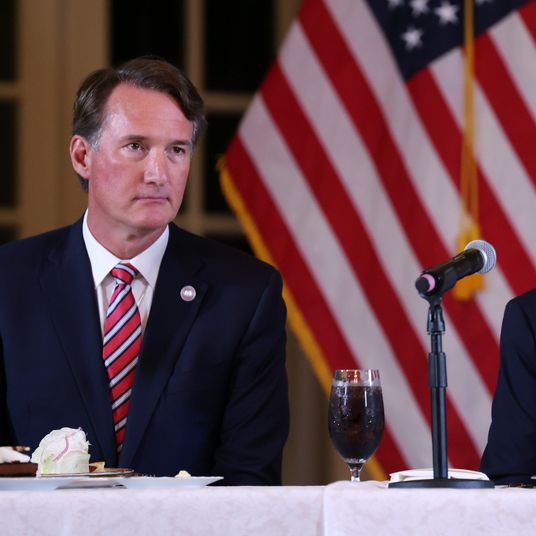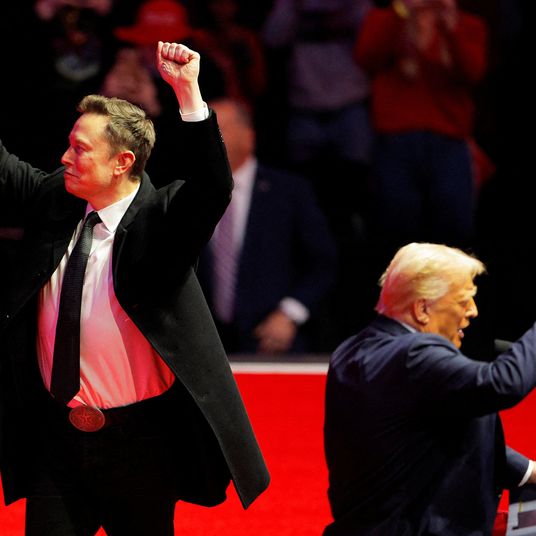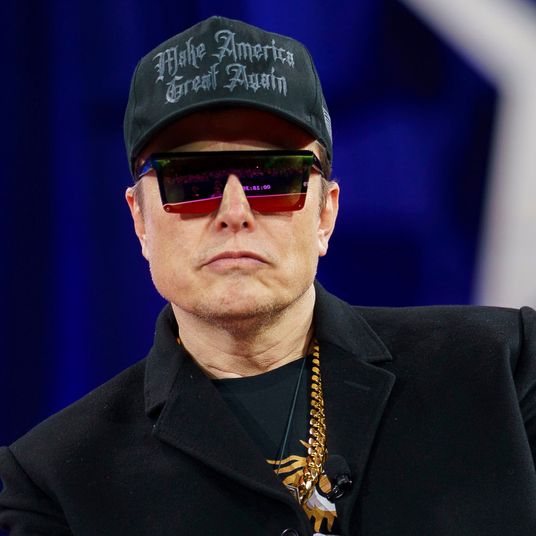“You are exactly right,” Elon Musk posted on X Wednesday night. The comment he was calling “exactly right” was a white-nationalist account saying the following:
Jewish communties [sic] have been pushing the exact kind of dialectical hatred against whites that they claim to want people to stop using against them.
I’m deeply disinterested in giving the tiniest shit now about western Jewish populations coming to the disturbing realization that those hordes of minorities that [they] support flooding their country don’t exactly like them too much.
You want truth said to your face, there it is.
In addition to the vast cultural influence he wields via his aggressively tilted content-moderation policies over what is still an important social-media organ, Musk is also a high-profile influencer within the Republican Party. Famously, he endorsed Ron DeSantis for president and produced his campaign launch.
By traditional standards, having such a figure so close to the candidate endorse such vile sentiments would force the candidate to make a statement of disavowal. Barack Obama famously had to deliver an entire speech explaining why he disagreed with Jeremiah Wright, even though Wright had no ongoing involvement with his campaign. John McCain cut ties with pastors who had made bigoted comments about Jews and Muslims.
DeSantis, by contrast, said nothing about Musk’s endorsement of white-nationalist conspiracy theories that directly inspired the Tree of Life massacre. I reached out to the DeSantis campaign for comment. It did not respond.
This is what it looks like when a political party has an antisemitism problem. The firewalls have broken down. Antisemites have too much power and influence to be cut off. Even those who disagree with antisemites need their support too much to risk an open breach.
The upsurge of left-wing protests against the Biden administration’s Israel policy has inspired conservatives to publish columns with headlines like “Democrats Have an Anti-Semitism Problem” (The Wall Street Journal) and “I’m a Proud Democrat. My Party Has an Antisemitism Problem” (Fox News).
It is certainly true that there is antisemitism on the left, frequently presenting itself as criticism of Israel. (The usual trick is to make an antisemitic statement and replace “Jews” with “Zionists.”) But it is overwhelmingly directed in opposition to the Democratic Party. The most antisemitic activists on the right tend to be pro-Trump, which is why the ranks of J6ers were overrepresenting with white nationalists. The most antisemitic activists of the left despise Joe Biden and generally oppose the Democratic Party.
When conservatives claim the Democratic Party is enabling antisemitism, sometimes they point to Democrats denouncing bias against Muslims or Arabs. Other times they highlight statements by the most progressive Democrats, like Rashida Tlaib, calling for a cease-fire or a one-state solution. Tlaib has made a lot of statements I consider reckless, or blinkered, and I certainly wish Democrats would nominate a more responsible candidate to represent the 13th district in Michigan, but she has never actually uttered anything a reasonable person would deem antisemitic. “From the river to the sea” is an inflammatory and irresponsible slogan that implicitly creates solidarity with terrorism precisely because it is ambiguous and open to multiple definitions, but it is not per se antisemitic.
One problem with identifying antisemitism is that it is wrapped up in political debates in which contestants have the incentive to define the term as broadly as possible. Israel hawks often label all critics of Israel as antisemitic, just as many progressives do the same on issues of race and gender. When the question turns from race or gender to Israel, conservatives suddenly start adopting the logical methods of Robin DiAngelo, wantonly ascribing secret motives to their adversaries, or insisting intention doesn’t matter.
It’s impossible to grasp the dynamics of the issue without simultaneously recognizing that many critics of Israel are concealing antisemitism inside of criticism of Israel, and many hawks are attempting to delegitimize all criticism of Israel by calling it antisemitic. (Here is my effort, in 2021, to define a fair standard for debating Israel and American identity politics.)
What healthy parties and political movements require is the ability to separate bigoted statements from legitimate differences of opinion, and to make clear the former is unacceptable.
A few years ago, Representative Ilhan Omar made antisemitic comments questioning the loyalty of Israel hawks and saying their support was “all about the Benjamins.” What happened next? Well, the party made clear those comments were unacceptable. Omar apologized, and Democrats supported a congressional resolution denouncing them. That is how a healthy party operates.
Unhealthy parties excuse statements by their members they would never accept if made by the opposing party. Marjorie Taylor Greene, in addition to famously blaming forest fires on a space laser controlled by the Rothschilds, once wrote, “An unholy alliance of leftists, capitalists, and Zionist supremacists has schemed to promote immigration and miscegenation, with the deliberate aim of breeding us out of existence in our own homelands.” If Tlaib or Omar had ever written something half that crazy, their careers would be over. Greene is not only safe in Congress, she gained an influential role as adviser to former Speaker McCarthy.
Donald Trump routinely shares social-media memes generated by white supremacists, spreads gross antisemitic stereotypes, has inspired Nazis to become actively involved in conservative politics, and invited Kanye West and Nick Fuentes for dinner. Republicans excuse all of this. (Trump also, of course, regularly denies that Muslim Americans have any right to participate in civic affairs on an equal basis or can ever become Americans at all, but nobody really calls this an “Islamophobia problem” because it’s obviously a conscious partywide strategy.)
The tweet endorsed by Musk expresses an idea that has long percolated among white nationalists. It blames Jews — or, at least, wealthy Jews — for secretly financing anti-white political causes and liberalized immigration, which they interpret as an attack on white people. Musk’s open endorsement inspired Charlie Kirk and Tucker Carlson, two of the most important voices in right-wing media, to express fulsome support for this idea.
If you want to see what an unhealthy party looks like, behold the contortions Ben Shapiro made on behalf of Musk:
Shapiro rarely eats breakfast before accusing somebody in the Democratic Party of hidden antisemitic motives. Musk is his ally, and the two men held what the Jewish newspaper the Forward described as a “lovefest” earlier this year to rebut complaints about Musk’s friendly treatment of white nationalism on Twitter.
Faced with Musk openly stating that he doesn’t care about Jews because they are responsible for diluting the white race by promoting mass immigration, Shapiro explained to his audience that Musk just spoke imprecisely. He simply meant he hates the Anti-Defamation League is all. (This is exactly the kind of sanewashing you hear on the left when a progressive says something antisemitic. Ignore what my friend said about the Jews; he just meant to say he hates the occupation.)
Then Shapiro quickly pivoted to whataboutism, claiming “a lot of these same people are absolutely silent” about Hamas, so they have no right to criticize Musk. (I can certify that Yair Rosenberg, who denounced Musk’s antisemitism, is also strongly critical of Hamas.)
Antisemitism exists on the left and the right. But there is one American party that is currently healthy enough to call out and exclude antisemitism within its ranks. And it is not the Republican Party.








